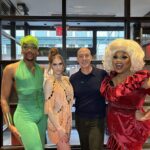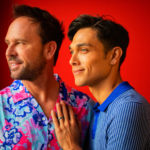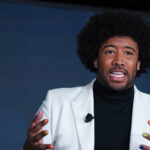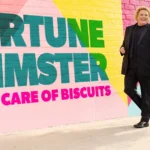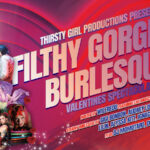Separately, they are critically acclaimed artists in their own right. Together, they form CelloVoci, music’s latest powerhouse hitting the scene hard. Two parts voice, one part cello, add in some piano, Branden and James and Effie Passero mix classic and modern-day pop with style and sensuality that instantly sets them apart. In their early formation, they have already toured internationally, enjoyed a sold-out performance at Carnegie Hall, and released their debut album Happy Days. With their individual credits, it is not surprising this merge of talents is flying out of the gate. Married couple Branden and James have been together for almost a decade. Singer Branden was a finalist on America’s Got Talent and cellist James has been featured with Olivia Newton-John, Bernadette Peters, and Idina Menzel, just to name a few. Singer-songwriter Effie Passero was a semi-finalist on American Idol and enjoyed multiple tours with Postmodern Jukebox, racking up millions of views on the group’s YouTube videos. Every one of CelloVoci’s songs is a journey. They often mashup music you never knew could go together, for example, “Bésame Mucho” and “Hotel California,” or “Chasing Cars” and “The Rose.” If you’ve seen them perform live, you know that in one moment the pathos of their music will bring you to tears, and in the next, they will have you tapping your feet. At the end of their concert, you are emotionally exhausted after the beautiful journey they have taken you on.
They met by chance while waiting out Covid in Puerto Vallarta. They agreed to take part in a fundraiser for the staff of a local theater and instantly sparked chemistry with each other. They joined forces and performed together for a number of livestreams during the pandemic. Effie’s ability to sing everything from opera to rock to musical theatre to pop attracted Branden and James, who often incorporate those same elements in their work. Effie was taken with the couple’s personality and musical ability. The fact that the friendship just automatically added to the mix made it impossible for them not to make music together. The creative process has been a journey for them, challenging and complimenting each other to make the most of their skills. Touring, recording, and performing together, they have learned a lot from each other.
Effie: I learn from Branden and James every time we travel, each conversation, and especially each performance. The nuance they have, and the way they carry themselves not only as musicians but as people is very impressionable and inspirational. No matter the circumstances they rise together. So, I’ve learned so much about what it means to be a team player, and how collaboration can be such a beautiful thing. I’m so used to protecting my craft and keeping it so close to my heart, but Branden and James have shown me the beauty in opening up to others and creating together.
Branden & James: Effie has this superpower to make herself so vulnerable onstage when you least expect it. You can hear it in her lyrics, the way she phrases vocal lines, and the utter pain and heartbreak that can show up in her vocal versatility. In life, Effie never really takes anything too seriously. Her personal code is that you can be nice to others, no matter how talented you are. We see this tremendous respect Effie has for humanity in her every day.

Photo by Duc Nguyen
As queer artists, they are able to bring that texture and sensibility to their work. There is a sensitivity to and awareness of emotions and creativity that is heightened. Their audience and fan reach is far beyond the LGBTQ community. Their group, and as individuals, are not hindered by labels. Perhaps this is the formula we need to build bridges between the queer and conservative sides. They don’t feel the need to add pomp and circumstance to their queer identity, they let the music speak for itself.
Our core audience is mainstream, heterosexual baby boomers, which is the bulk demographic of the classical-crossover genre. Because we often play shows for this demographic in rather socially conservative areas, we’ve become accustomed to not sharing about our sexuality. At first, we felt that this was somehow hiding a part of who we are. We aren’t ashamed of our queerness at all, we are very open and public about it on social media. But, if our show doesn’t have a particular queer billing, we don’t think it’s always necessary to talk about our sexuality.
Their shows are hitting no matter where they go. In their opinion, what is it that audiences respond to the most?
When people come to classical crossover recitals/concerts, they are not expecting such free-flowing spirits on stage. The three of us together are so sibling-like and silly, it is apparent within the first five minutes just how much we love each other. Not only do people respond highly to our music, but they speak so highly of our love for each other and how rare that is to see on stage these days. Our genuine love and respect that we showcase for each other on stage is something people carry home with them. We would love to say we are inspiring others to act the same. Audiences also really love how we take a piece they grew up with and put a fresh spin on it. We are not dissecting a classic and making it “wrong”, but breathing new life into a song maybe your mother sang to you growing up and bringing those memories back in full force. Audiences really appreciate that the most.
Their debut album, Happy Days is nothing short of stunning. It captures the emotion, the storytelling, and the musical prowess of their live shows. Keep the Kleenex box handy, it will move you to emotion. In a world of noise, electronic beats, and autotune, this is a fierce reminder of the power of actual music. Their mashup of “You Are My Sunshine” with “Somewhere Over the Rainbow” melted our hearts. What were some of the group’s biggest challenges in bringing the show to an album?
The recording studio is like a vacuum – void of any energy exchange with an audience. The microphones aren’t forgiving at all, and every weakness is picked up and amplified. It can be a frustrating and disheartening process. But, unlike with live performance, it is possible – with a lot of patience and perseverance – to listen and refine things until they are just right.

Photo by Michael Dar
The love and affection between Branden and James is palpable. But even the best couple can be put to the test when creating music, traveling, and performing, while having to take care of all the other parts of being married. How do they maintain a healthy relationship while in such a creative working partnership?
Branden: James and I are very lucky. We are the dearest of friends. I always say that if we weren’t together, we’d probably be best mates who would still spend endless amounts of time together. I have a very strict rule in our relationship: we never go to bed with an unresolved argument. We are adults, and there is nothing we can’t resolve with some mature conversation. I maintain the same rules in our working relationship. If we ever have an artistic disagreement, we always resolve it before we go on stage. Audiences are much more perceptive than some give them credit for. If our energy is off, the audience knows. I never want to show that side of us to an audience that negates our mission of bringing people together and healing them with our music. This rule of resolution has served us very well over the past 10 years relationally, and nine years musically. We feel very blessed because we understand some groups have irreconcilable differences that ultimately lead to parting ways. If we stick to our formula, there will always be peace in our union, I think.
With all the performances under their belt, all of the places they’ve visited, and all the audiences they’ve learned from, how has their music changed the most from their early years?
James: It’s funny actually, because we still perform a lot of arrangements we made in our first years together. The likes of “Hotel California,” “Hallelujah,” and our medley of music from The Phantom of the Opera, have become fan favorites that we can’t seem to stop playing. In saying that, I think we’ve certainly developed as performers – maturing in our delivery and deepening our musical instincts with one another because we spend so much time together. I think what’s helped us to last as a couple is the fact that we are great friends who genuinely enjoy spending time with one another, and we’re committed to doing the hard work of maintaining a long-term personal and working relationship.
A lot of the couple’s music deals with love – the difficulties, the happiness, the heartbreak. How does being a couple shade those songs?
It makes it real. When you’re living the things that you’re singing about/expressing through music, it makes it much more honest and vulnerable because you’re able to relate to what you’re performing. A lot of people comment on how much they love our connection on stage – it’s a comment we often get from people who have just seen us for the first time. I don’t think it is possible to fake that. People notice it because it’s real, and we tap into it (both consciously and subconsciously) when we’re on stage.
Effie is a complete chameleon. With punk rock hair, tattoos, and bold fashion, she challenges norms as she launches into a sweet soprano singing the hell out of opera. She can also rock it out, she can also transform songs like “Creep” into a heartbreaking ballad. Give her jazz or musical theatre? She’s got it. Watching her transform on stage is watching a master artist. She’s also very down to earth and remains humble. Her career and her life have had many iterations, with milestones like American Idol and Postmodern Jukebox just pin posts amid her journey.
I’ve been singing since I was five. I’m incredibly lucky to say that with everything my little heart desired, my mom was there to make it happen. So, from musical theatre to opera, to songwriting- the evolution into American Idol and Postmodern Jukebox is a result of having a supportive parent. Obviously, there was a lot of demanding work and tears, and not everything was supportive all the time, but I am the person I am today because of all the different versions of me I got to meet. Each stage taught me resilience, and how to appreciate criticism instead of taking it so personally. Especially through American Idol and Postmodern Jukebox, I learned how to become a frontwoman and not depend so much on my piano. My piano was always such a crutch for me! I was scared to be up front and center, and it definitely wasn’t natural for me when I first started. With the help of all my other musician friends, I became more confident in my capabilities and now really love being a lead singer! There is still so much more to learn and I’m excited to see what comes next.
Touring with Postmodern Jukebox globally not only showed her a different side of the world but also made her a viral video hit. From their filmed music videos to audience video captures of her performances, the views started racking up.
Postmodern Jukebox has been not just life-changing, but lifesaving. Like so many of us during the pandemic, I was very unsure of the future of music and live performance. So, when I got that initial email to see if I was interested in joining their post-pandemic tour, of course, I cried and was so elated. I swore to never take another performance for granted ever again, regardless of the size of the audience. There are too many on-stage memories to share, but there was one recently that was very moving to me. I performed “Hallelujah” to an audience in Finland, and by the end, most everyone was standing and waving their hands in the air. Part of me always finds it funny because it is *not* the religious song so many people think it to be, but this particular night it seemed like that song weighed heavily on many people’s hearts. They were crying and shouting and made me feel like we were in some kind of revival. It was wild.
Her success has come at the cost of having to overcome life’s challenges. If you follow her on social media, you know she doesn’t hide behind smoke and mirrors. Emotional highs and lows, career lulls, heartbreak, and a tough childhood are just a part of who she is as her successes. Sharing this with her fans is not to create content, it is to tell her real story.
Like a lot of people, I didn’t have the most amazing childhood. I had my brothers, and we were each other’s rocks, but sharing feelings wasn’t really a thing until I was much older. Music became my way to share how I was feeling, and as I got older my songs became more relatable to other people. As I understood the responsibility we hold as artists to share our gifts, it also became apparent to me that not only do people want to celebrate our successes, but they appreciate and find comfort in our struggles. No one is alone, no matter how much it might feel to someone at that moment. So, a certain song, or a certain poem, no matter how Shakespearean or simple in its message- might save a life. Vulnerability is a strength, and being authentic is something more people should strive to be. So if I can inspire others to be that way, I will be proud of that.
With everything that she has accomplished and been through at an early age, and with a world of possibilities ahead of her, what is she most proud of looking back on?
Looking back on my life, I can say I am proud of many things. My musical accomplishments always surprise me when I look back on them. You forget so much of what you do! Next year I am singing at the Sydney Opera House. If someone had mentioned that to little 13-year-old Effie, I would have laughed, but now it’s a reality. I am so proud of how far I have come, from that little weird black sheep in the middle of nowhere Californian agriculture town. But now, I am most proud to say that I am continuously striving to be better. As a woman, as a friend, as a musician. I’m at the age where I would love to be remembered for my music, but I’d love most to be remembered as a good person.
For more information about their tour dates, album, and some behind-the-scenes fun, check them out on IG: @CelloVoci
[Featured Photo by Ashley Meyer Photography]Last modified: December 11, 2024





